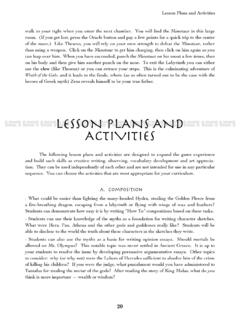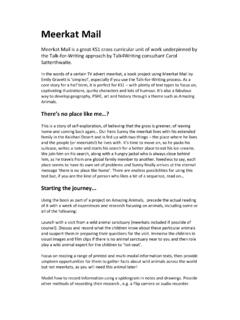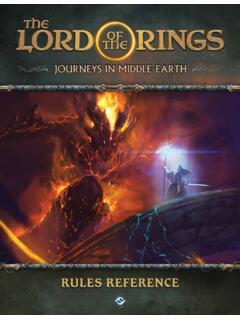Transcription of T H E I L L U S T R AT E D ODYSSEY - Mythweb
1 THE. ILLUSTRATED. ODYSSEY . FROM THE CREATORS OF Mythweb . CONTENTS. I.) Introduction II.) Background III.) The ODYSSEY IV.) Notes V.) Pronounciation Key 1. Text by Joel Skidmore Illustrations by Mark Fiore copyright 1997, 1998 Mythweb This material is protected by copyright but may be duplicated for classroom and homework distribution. 2. Introduction The Greek myths were first passed on by word of mouth, down through the violence of a dark age. The two or three centuries beginning about 1125 were marked by strife and turmoil. The course of civi- lization was set back by centuries. Later Greeks, look- ing back through the dim prism of the centuries of vio- lence, spoke of a time when heroes walked the earth.
2 These exceptional men and women fought monsters, performed superhuman feats and consorted with the gods themselves. The Ancient Greeks were polytheists and believed in a multitude of immortal deities. The greatest of these lived on the remote heights of Mount Olympus but were by no means aloof from the mortals below. The Olympian gods communicated with their subjects by omens and oracles. Spokespersons for the divine, oracles answered questions, often in rid- dles. The greatest was at Delphi. The gods decided the outcome of athletic contests and battles. They even took up arms themselves. And they aided or hindered the heroes in their quests. a hero 's lot was out of the ordinary from the very outset.
3 He or she might be the offspring of an immor- tal deity. Some heroes were abandoned in the wilder- ness as babies. Oedipus and the heroine Atalanta were thrown to fate in this way. Oedipus was saved from certain death by the kindness of a shepherd. Atalanta 3. was nursed by a bear. When she grew up, she could outrun, outshoot and outwrestle most men, fellow heroes included. Heroes often received an unusual education. Some were tutored by Chiron, greatest of the centaurs. The centaurs were half man, half horse. Notoriously uncivilized, they were prone to such behavior as disrupting wedding feasts by trying to carry off the bride. Chiron was distinguished from the other centaurs by his civility and cultivation of the healing arts.
4 Among other skills, he taught young heroes the medici- nal value of herbs and plants. Back before the Dark Age, kingdoms had produced glori- ous arts and crafts, typified by the golden masks found on the site of ancient Mycenae. The myths go back at least as far as this era, known as the Mycenaean. It is also known as the Heroic Age. As the time of the heroes gave way to the dim centuries of violence, ruins and abandoned dwellings lay scattered upon the land. The kingdoms that had seen the exploits sung about by bards like Homer now lay in shambles. Some speculate that Dorian invaders from the north with iron weapons laid waste the Bronze Age culture. Others look to internal dissent, uprising and rebellion.
5 Or perhaps some combination brought the era to an end. One thing is certain civilization had taken a giant backward step. Material culture and the life of the mind were reduced to a lower com- mon denominator. And when the flame of learning and the aspiring spirit was kindled anew, people looked back across the time of darkness to what seemed a golden age. Then it was, they thought, that a special breed of men and women had trod the earth not quite gods but not quite human either. They made up stories about them, some based perhaps on faint recollec- tions of real individuals. These were the heroes of Greek mythology. 4. Background The Trojan War was over. The clever Greek Odysseus had tricked the enemy into bringing a colossal wooden horse within the walls of Troy.
6 The Trojans had no idea that Greek soldiers were hidden inside, under the command of Odysseus. The Greeks had been been laying siege to Troy for nine long years, but suddenly it looked like their whole army had departed, leaving the horse behind. That night, while the Trojans slept, Odysseus and his men emerged from the horse's belly. Opening the city gates, they admitted their comrades, who had snuck back in the dark. Troy was sacked and the Trojans utterly vanquished. Now it was time for Odysseus and his fellow warriors to return to their kingdoms across the sea. Here begins the tale of the ODYSSEY , as sung by the blind minstrel Homer. 5. Book One "Oh Goddess of Inspiration, help me sing of wily Odysseus, that master of schemes!
7 " So Homer begins his epic, though the hero himself is still off- stage. We are treated to a glimpse of life among the supreme gods on Mount Olympus. Athena (uh-THEE-nuh) Grey-eyed Athena, the goddess of war, is addressing an assem- Zeus (ZOOS or ZYOOS) bly headed by Zeus, the king of gods: "Even though we all love Odysseus, he alone of the Greek heroes has been waylaid on his journey home from Troy. When Cyclops (SY-klops) he put out the eye of the giant Cyclops, he provoked the wrath of the God of Earthquakes.". Poseidon (poh-SYE-dun) The Olympians know she refers to Poseidon, the Ruler of the Sea, who is off enjoying a banquet elsewhere. "And now Odysseus languishes on the lonely island of the nymph Calypso, pining for home.
8 Is that your will, Zeus?". "You know very well it isn't," replies the god of gods. Hermes (HER-meez) "Then send your herald, Hermes, flying to Calypso. Make her let Odysseus go. I myself will inspire the hero 's son." Athena departs to fulfill this vow. Adopting a mortal guise, she appears at the gate of Odysseus'. Telemachus (tel-EM-uh-kus) mansion on the island of Ithaca. Odysseus' son, Telemachus, does not recognize the goddess in her human form but invites the stranger in as a guest. Over food and wine they discuss the Penelope (peh-NEL-uh-pee) fact that Telemachus and his mother Penelope are plagued by suitors for Penelope's hand in marriage. All the eligible young nobles of Ithaca and the neighboring islands, assuming that Odysseus is dead, are vying for Penelope.
9 And while they wait to see which one of them she will choose, they help themselves to her hospitality, feasting through her herds and guzzling her wine. Telemachus is power- less to do anything about it. "Warn them off," counsels Athena. "Then fit out a ship that will carry you to the mainland. There you must seek tidings of your father.". 6. Book Two Inspired by Athena, Telemachus calls a council of all the men of Ithaca. He asks them how they can stand idly by and allow his mother's hospitality to be abused. Antinous, one of the ringlead- Antinous (an-TIN-oh-us). ers of the suitors, brazenly puts the blame on Penelope, for not choosing one of them as husband. "She has even resorted to trickery," claims Antinous.
10 "At first she said she'd choose among us just as soon as she finished her weaving. But she secretly unraveled it every night.". Hot words are exchanged, and Zeus sends an omen. Two eagles swoop down on the congregation, tearing cheeks and necks with their talons. A wise man interprets this as impending doom for the suitors. In closing, Telemachus asks his countrymen to fit him out with a ship so that he might seek news of his father. Back in his own hall, Telemachus is greeted by Antinous, who suggests that they share a feast together just as they did when Telemachus was still a boy. Telemachus replies that he'll see him dead first. The other suitors mock the young man for his fighting words.



